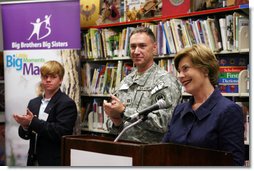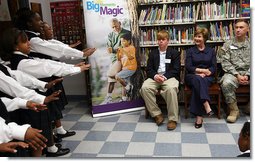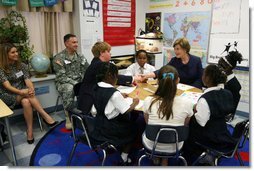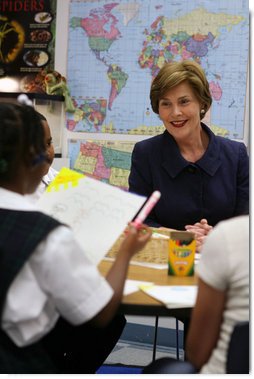|
Home >
News & Policies >
November 2007
|
For Immediate Release
Office of the First Lady
November 1, 2007
Mrs. Bush's Remarks at a Helping America's Youth Visit with the Big Brothers/Big Sisters of Southeast Louisiana
Good Shepherd Nativity Mission School
New Orleans, Louisiana
4:08 P.M. CDT
MRS. BUSH: Thank you, Karen, and thank you for your good work here at Good Shepherd Nativity Mission School. And thanks to you, Taylor, for telling us about your outing with your "Big." And thank you very much, Travis, for standing with Taylor. Thanks, Taylor, for being a really great example to young people as well.
And thanks to the choir. That was beautiful. Thank you all very much. It was something we all really loved hearing.
 I want to acknowledge Andrea Jefferson, who met me today, coming in today.
Thank you so much, Andrea, for joining us. And Delores Medina-Whitfield,
the CEO of Big Brothers/Big Sisters of Southeast Louisiana. I think Curtis
Porter is here from HHS. The Volunteers of America of Greater New Orleans
are represented. Cindy Sturtevant, who's from MENTOR, the MENTOR program,
and Jay Hein, the Director of the Office of Faith-Based and Community
Initiatives, thank you. And thanks so much also, Desiree.
I want to acknowledge Andrea Jefferson, who met me today, coming in today.
Thank you so much, Andrea, for joining us. And Delores Medina-Whitfield,
the CEO of Big Brothers/Big Sisters of Southeast Louisiana. I think Curtis
Porter is here from HHS. The Volunteers of America of Greater New Orleans
are represented. Cindy Sturtevant, who's from MENTOR, the MENTOR program,
and Jay Hein, the Director of the Office of Faith-Based and Community
Initiatives, thank you. And thanks so much also, Desiree.
I'm happy to be with you here at Good Shepherd and to meet with Big Brothers and Big Sisters of Southeast Louisiana. I've had fun a few minutes ago visiting with some of the "Littles," and I got to see pictures of their -- drawings of their favorite activities with their Big Siblings. "Bigs" take their Little Siblings to all sorts of fun events, like we just heard from Taylor -- fishing excursions, movies, even camping trips. They also make sure that their "Littles" do their homework and learn to be responsible by helping with chores like mowing the lawn. Actually, I didn't see any pictures of those. (Laughter.)
All of these activities are valuable to kids who participate in them. They offer children who might not have many stable, positive influences in their lives one-on-one time and personal attention with a responsible, caring adult in their lives. We know that positive adult role models are essential to young people's success. Studies show that children in mentoring relationships are more likely to get better grades, develop healthy relationships with others and avoid risky behaviors.
The Big Brothers/Big Sisters of Southeast Louisiana understands the importance of mentors. You know your work is especially important here on the Gulf Coast, where children who lost their homes, their belongings, their friends and their schools in the hurricanes need the permanence and the encouragement of a mentor.
Even when your offices were destroyed by the floodwaters of Hurricane Katrina, Big Brothers/Big Sisters of Southeast Louisiana relocated to new offices, and then expanded your service area from eight parishes to 17. Congratulations and thank you very, very much for doing that. (Applause.)
 The work you do through Big Brothers/Big Sisters -- helping young people
build the knowledge and the self-respect they need to lead successful lives
-- is at the heart of the Helping America's Youth Initiative. President
Bush announced Helping America's Youth in his 2005 State of the Union
address, and he asked me to lead it. So over the last two and a half
years, I've traveled throughout the United States, visiting with young
people and with the adults who are so important to their lives.
The work you do through Big Brothers/Big Sisters -- helping young people
build the knowledge and the self-respect they need to lead successful lives
-- is at the heart of the Helping America's Youth Initiative. President
Bush announced Helping America's Youth in his 2005 State of the Union
address, and he asked me to lead it. So over the last two and a half
years, I've traveled throughout the United States, visiting with young
people and with the adults who are so important to their lives.
I've been to schools and to after-school programs. I've met with mentors and visited Boys and Girls Clubs. I've been to a sports program in Detroit, a debate program in Atlanta, and gang-intervention programs in Los Angeles and Chicago.
All of these visits led to a White House Conference on Helping America's Youth, and since then we've hosted four regional conferences across the country, and a fifth regional conference will be in Dallas next week.
At these conferences, we've introduced concerned adults to the online, interactive Community Guide to Helping America's Youth.
The guide helps adults learn more about the problems facing young people in their own communities, and what resources are available to address these problems. The guide's "Program Tool," for example, helps adults find youth initiatives that research has proven are effective in reducing substance abuse, gang activity and other risk factors by our young people. And of course, you'll be very happy to know that Big Brothers/Big Sisters is one of these recommended programs.
The Community Guide is available on the Helping America's Youth website, at www.helpingamericasyouth.gov -- that's g-o-v. So I urge you to go to the website and use the Community Guide to address the unique challenges facing young people here in New Orleans.
The challenges facing young people in the Crescent City -- and across our country -- are far greater than they were just a generation ago. Drugs and gangs, predators on the Internet, violence in television and in real life are just some of the negative influences present everywhere.
And as children face these problems, they often have fewer people to turn to for help. Many boys and girls spend more time alone or with their own peers than they do with any member of their family. More children are raised in single-parent families, most often without a father.
 Millions of children have one or both parents in prison. In addition to
the difficulties of being separated from mom or dad, these kids also
struggle with the economic, social and emotional burdens of their parents'
incarceration. Studies show that children with an incarcerated parent are
more likely to commit crimes themselves. So one of the best ways to help
these young people avoid dangerous behaviors is to pair them with mentors
-- caring adults who can step in with the guidance and personal attention
that they miss from their own parents.
Millions of children have one or both parents in prison. In addition to
the difficulties of being separated from mom or dad, these kids also
struggle with the economic, social and emotional burdens of their parents'
incarceration. Studies show that children with an incarcerated parent are
more likely to commit crimes themselves. So one of the best ways to help
these young people avoid dangerous behaviors is to pair them with mentors
-- caring adults who can step in with the guidance and personal attention
that they miss from their own parents.
Big Brothers and Big Sisters -- and mentoring organizations like all of these others -- do an outstanding job of making sure children with incarcerated parents have the positive role models they need. Through your national Amachi program, community and faith-based organizations team with public agencies to identify children of prisoners, and then to pair them with adult mentors. Currently, there are 273 Amachi-based programs in 48 states, serving more than 60,000 children.
President Bush and I believe that every child in the United States should have the adult support and guidance they need to lead healthy lives. In 2003, President Bush announced that our government would support the training and recruiting of mentors, and called on men and women across the United States to be involved in the lives of children in need. In response to the President's call, Congress established the Mentoring Children of Prisoners program.
Mentoring Children of Prisoners is run by the Department of HHS, and over the last three years, the Administration for Children and Families, which is the department there at HHS, has provided $50 million in grants to 219 strong organizations that match children of prisoners with mentors. With these grants, nearly 70,000 children have been paired with mentors -- and the initiative is on track to match 100,000 children by the year 2009.
So today -- and this is my special announcement -- I'm happy to announce that ACF will launch a new voucher program to help the Mentoring Children of Prisoners program reach even more families. Congress has approved $30 million over the next three years to fund vouchers that families can use to subsidize mentoring services in an approved community program in their neighborhood.
 Currently, if children of prisoners don't live near one of the 219 programs
that receive grants from Mentoring Children of Prisoners, they either have
to travel a long distance to benefit from an approved program, or forgo MCP
services entirely. With these new vouchers, 24,000 children will be able
to enroll in mentoring programs suited to their needs and convenient to
their families.
Currently, if children of prisoners don't live near one of the 219 programs
that receive grants from Mentoring Children of Prisoners, they either have
to travel a long distance to benefit from an approved program, or forgo MCP
services entirely. With these new vouchers, 24,000 children will be able
to enroll in mentoring programs suited to their needs and convenient to
their families.
The new voucher project will be administered by MENTOR, a national mentoring partnership. MENTOR will certify the quality of eligible mentoring programs, and work with caregiver support groups, school districts, faith- and community-based organizations, social service agencies and correctional systems to identify children in need of mentors.
MENTOR will also establish a national call center to provide families and caregivers with information about the vouchers, customized to the personal and geographic needs of their child. The call center will also help families and caregivers choose the mentoring program best suited to the unique circumstances of their family.
With this new voucher program, vulnerable children across the United States can benefit from the support of caring adults -- adults like Bridget Falcon, who was just honored with the President's Volunteer Service Award. Bridget has been involved with Big Brothers/Big Sisters of Southeast Louisiana since 2004 -- and has mentored her Little Sister, Mariah, for the last 16 months.
Mariah, who's 9, participates in the Mentoring Children of Prisoners program. She joined the program because she was struggling in school. She's an only child, and she remembers how lonely she was when most of her family had to move out of New Orleans because of the hurricanes. And that was until she met Bridget. Now Mariah enjoys reading, playing games, karate and bowling. And she's doing better in school and in her relationship with others. Bridget and Mariah are out here in our audience. (Applause.)
Through this program, young people can also benefit from the support of adults like Adrienne Edwards. Adrienne is a student at Xavier University, and she became involved with Big Brothers/Big Sisters because she saw mentoring as an important part of her own life. Adrienne loves the time she spends with her "Little" Darriell, who's in 2nd grade here at Good Shepherd School. Darriell says she enjoys playing with toys, her cousins -- and in her teacher's hair. (Laughter.) Encouraged by Adrienne, Darriell plans on pursuing several careers -- including being a cheerleader, a doctor, a police officer, a ballerina -- and, of course, working here at Good Shepherd School. I think Darriell is here in our -- there she is. (Applause.)
Mentors like Bridget and Adrienne remind us of how important caring adults are in the lives of children. And they remind us that through community programs like Big Brothers/Big Sisters and Volunteers of America of Greater New Orleans, government initiatives like Mentoring Children of Prisoners -- and the kind of personal attention and dedication shown by all the caring adults who are here today -- each of us has the power to help America's youth.
Thank you all very much for your dedication to our young people. May God bless you, and may God bless your very important work.
Thank you so much. (Applause.)
END 4:21 P.M. CDT
![]() Printer-Friendly Version
Printer-Friendly Version
![]() Email This Page
Email This Page


